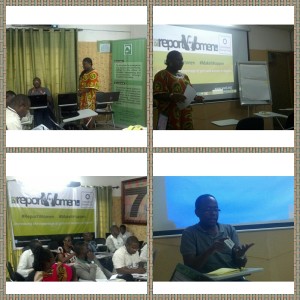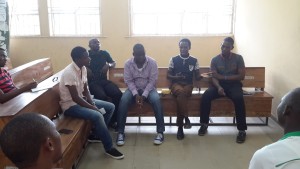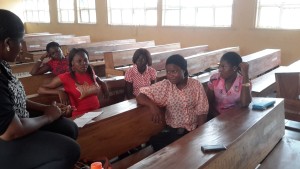Across West Africa, women and girls struggle daily to ensure that their rights are recognized. Urban centres offer more protection than rural areas where patriarchy largely goes unchallenged. But the widest disparity is not the urban-rural divide but the divide between the expectations of those of us who fought for democratic change and the reality we discovered under democratic regimes.
Naively perhaps, we had expected that women and girls’ rights would be added on in our countries once democratic systems were secured. Yet, now we find that while most countries in west Africa are democratic, the rights of women and girls are not being advanced as a matter of priority. With the Arab Spring, we discovered why. Since democracy gives power to the people, women and girls’ rights become subject to what the majority believes.
What do the majority of people in West Africa believe? Going by the fact that no West African country is in the top ten for gender equality in Africa whereas six are in the bottom of the ranking done by the African Development Bank, it would seem that they do not believe in equality of women and girls.
That’s the bad news. The good news is that positive change can be rapid and the key is leadership that drives change. I experienced this first hand over the last few days during my first ever visit to Rwanda where I was invited to speak at the pre-forum to the African Union Commission’s dialogue on Democracy, Governance and Human Rights.
As you know, Rwanda now leads the world in the proportion of women in parliament and ranks 2nd after South Africa, according to the Africa gender equality index. To visit Rwanda is to enter a country transformed from the genocide of 20 years ago during which one million people were killed in one hundred days to a country that has not only recovered, but grows and excels.
The question for us in West Africa is how can we build a movement where leaders wherever they are found take principled positions and exercise power responsibly to uphold the human rights of women and girls?
I would like us to look briefly at three issues calling for leadership and action.
- Child marriage.
- The culture of violence in the home and in the society.
- And women’s political participation.
Child Marriage
Child marriage is a problem in the region. In Nigeria, according to a National Population Council Report, child brides account for as many as 48 per cent of young girls who are married off before their 18th birthday.
Southern Africa has offered us an inspiring example of a female traditional chief who challenged the practice and was able to overturn all such cases in the communities under her jurisdiction, returning the girls back into classrooms where they belonged.
In contrast, in Nigeria, a major advocate for women and girls’ rights and one of the most powerful religious and traditional kings in the country came under some controversy recently when he contracted a royal marriage with a princess from the Adamawa caliphate. The king, the Emir of Kano, is 54. The bride, 18. Some critics were pacified to learn that the bride will not begin married life until after completing her university education in three years, by which time she will be twenty-one. However, many continued to express reservations due to the expected power difference between the couple.
To my mind, they missed a golden opportunity to highlight the fact that eighteen or twenty-one is not twelve or thirteen. Just six years at the minimum but enough time to ensure that giving birth doesn’t claim the mother’s life; enough time to enable the girl-child to complete her secondary school and have that much more knowledge and tools for taking care of the children she will bear; and enough time to create more options for herself. Considering that the challenge in remote parts of the north and among poor rural families across Nigeria is whether to marry off girl-children, that bigger danger must be at the fore-front of our thinking. What is gained by seeking to alienate a leading authoritative voice whose advocacy can probably do more than that of any other figure in the region for our quest to end child marriage?
Related to ending child marriage is the need to secure the right of all girls to an education. In post-Ebola Sierra Leone, as many as 5000 girls were found to have become pregnant over the course of the year when schools were shut to contain the epidemic. So far, the girls are still out while the government vacillates between condemning them and promising to make special provisions for their continued education. It is worth noting that none of the boys who were involved in getting the girls pregnant are being kept out of school. We cannot on one hand ask parents to keep their daughters in school and on the other condone the fact that there are no schools for girls who become pregnant. Neither cultural stigma, religious beliefs nor inadequate planning by the state or society can be allowed to trap girls in ignorance. All girls must be able to go to school!
Secondly, there is an urgent need for leadership to push back on the culture of violence in the home and in public spaces.
Over the last ten years, there is growing awareness about violence against women across West Africa. There is also increasing recognition that it is wrong although many people, women included, continue to believe that a man has the right to ‘correct’ his wife by beating her. However, key in changing mindsets is the adoption of legislation to criminalize violence against women and girls in all its forms and enforcement of this law.
Guinea, where government forces sexually violated at least 109 women during a peaceful protest in September 2009, inspires us all with the June indictment of the then president, Mousse Dadis Camaro, for this atrocity. In this case that saw the judicial system of Guinea supported by the United Nations, the region has been able to establish the fact that there will be no immunity for those leaders that violate the rights of their female citizens.
However, whether women and girls in the region can expect to live in safety and security, to have their rights recognized and protected, depends significantly on political decisions; decisions taken in an arena where many in the society believe that women and girls do not belong.
Which brings me to the third of the three issues – women’s political participation.
We cannot claim to have a democratic system when half of the population – women and girls – are excluded from effective participation. Unfortunately, more and more, we see how women and girls’ ‘not belonging’ in the political arena translates into a diminishing quality of life. Lacking representation, they lack voice. Women and girls cannot afford to continue to accept the notion that they do not belong in a space where decisions that will affect their lives are taken.
Consider the crisis of Boko Haram’s insurgency in Nigeria. Partly a result of the dysfunctional campaigning practice of politicians mobilizing unemployed young men who they arm to intimidate their opponents, and who they later dump once the elections are over. Partly a backlash from the extra-judicial killing of the leader of a fringe religious sect by the police. And partly the unexpected fall-out of the fall of the Gaddafi regime in Libya that saw the influx of mercenaries and arms into the sahel.
The combination of these three factors, the first two caused by poor decision-making by male politicians and government security officers in Nigeria, has now resulted in a crisis that has claimed 20,000 lives and displaced 2.3 million people. Women and girls suffer disproportionately. Of the 276 girls in the school in Chibok that were abducted in April 2014, 219 are still captive, 600 days on, along with hundreds, if not thousands, of other captives. And worse still, the Boko Haram sect has started using young girls as suicide bombers.
Beyond condemning Boko Haram and other violent extremist groups, we must acknowledge that they are by-products of misgovernance. They, like most citizens of Nigeria, are asking the question – does anyone care about them? When we violently put down violent extremism, it stops the violence. But if we do not answer the question that precipitated the violence in the violence, we only solve the problem momentarily. The human need to belong, to be recognized by others, will propel the children of Boko Haram to rise tomorrow as it propelled the children of Maitatsine to rise today.
Initiating a dialogue between people and leaders around how we can practice a more responsible form of democracy and governance has the potential to transform our societies. Women are skilled at fostering dialogue. Now more than ever, they need to step forward to help shape the public space so that the democracy is more representative, the economies more inclusive.
Women must mount pressure to see an end to unhealthy practices in politics. Thuggery is no substitute for campaigning. ‘Cash and carry’ electoral tactics where vote buying is the norm and negligence the democratic dividend many politicians deliver during their term, must also be made to give way to performance-oriented leadership.
So it is on this challenge of political participation that I would like to conclude my remarks. It took a civil war that decimated Liberia before the people there conceded political leadership to a woman. Now President Ellen Johnson Sirleaf is in her second term. She may not have a perfect record, but no-one can say her administration isn’t an improvement on the two predatory, murdering regimes that preceded hers. While she stands alone as the only female president West Africa has produced, from Senegal we have had two effective female prime ministers, both of whom had served as Justice Ministers; in the role of Attorney General of the nation, the first had managed the process that produced a new constitution for Senegal while the other successfully prosecuted political office holders for corruption. From Burkina Faso, we had a female interim head of government and in Nigeria, potentially the first female elected governor of a northern state.
Influence isn’t only restricted to elected and appointed political officials. Ekiti state in Nigeria benefited from a feminist first lady who supported civil society groups to ensure the passage of the Gender Based Violence and the Equal Opportunity bills. Beyond the political arena, all those who have a voice in our economic, political, traditional, and civil society spaces, can and must galvanize their constituents to work for a more gender-equal West Africa.
Women and girls are like the canaries in mine shafts. They are the first to be affected when things start to go wrong in a society and because of their gender-imposed limitations, they are often most adversely affected by poor governance and communal conflicts. Ensuring that they can be heard, that their rights can be protected and that their needs can be met will foster social resilience and positive change. Let us use the opportunity provided by the Carter Centre in convening this conference to share information and ideas and to commit to work together to make real the promise of democracy for the women and girls of our region.
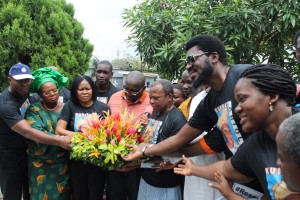
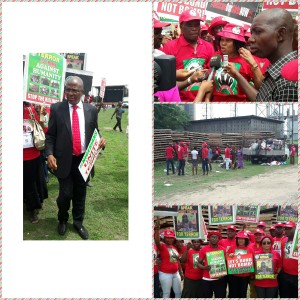
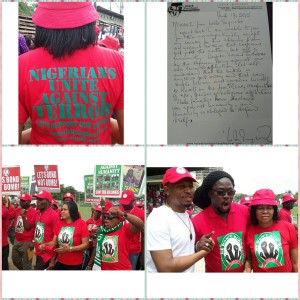 thers. Several artistes were on ground to entertain the teeming crowd, amongst which include Naeto C, Daddy Showkey, Waje, Terry G, and Oritsefemi. This rally was enthusiastically endorsed by Prof. Wole Soyinka, renowned Noble Laureate of Literature and Prof. Tunde Braithwaite.
thers. Several artistes were on ground to entertain the teeming crowd, amongst which include Naeto C, Daddy Showkey, Waje, Terry G, and Oritsefemi. This rally was enthusiastically endorsed by Prof. Wole Soyinka, renowned Noble Laureate of Literature and Prof. Tunde Braithwaite.